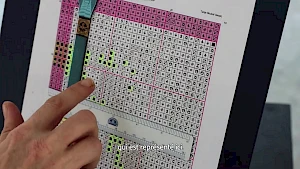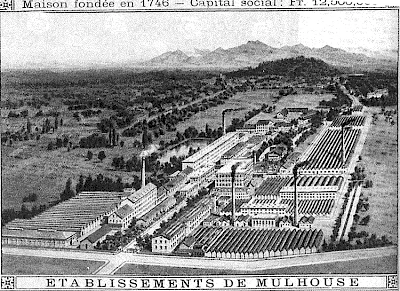The Mulhouse Project
| Year: | 2018-2019 |
| Venues: | Mulhouse, France |
| Works: | |
| Exhibitions: | |
| Catalogues: | |
| Events: |
The Kunsthalle Mulhouse and the Municipal Archives of the City of Mulhouse welcomed Tanja Boukal for a long-term research and creation project around the DMC archives.
The Sociopolitical Background
Mulhouse was once a city of the industrial revolution, when innovation in steam and electricity revolutionized the economy and changed the face of the city and the way people live. The large factories have shaped the character of the city for centuries. But what even decades ago seemed like the pinnacle of modernity has today lost its purpose. The industry here was shut down or taken over by machines.
The Alsatian textile company DMC is more than a symbol for this change. From 10.000 workers which were working at DMC Mulhouse, only 250 are left. Being an Artist who works a lot with embroidery and other craft techniques, Tanja Boukal is well aware of the history and significance of this company.
They were one of the first who published a complete manual of textile handcrafts in 1884. The Encyclopedia of Needlework was written by Thérèse de Dillmont (10 October 1846 – 22 May 1890), head of the design department of DMC and head of her own publishing and crafts enterprise. Dillmont's name was an asset to DMC, which continued to publish books under her name after her death. Over 100 books were attributed to Dillmont. New editions of her works have been published to date.
Trained in embroidery in the 1990s at the same school as Dillmont, the artist feels intellectually close to this great embroiderer and to all those who, like her, put their talent and passion for needlework at the display in order to teach their skills.
The Approach
For several months, Tanja Boukal was engaged in the documentary collection of DMC. She researched the history of DMC and Therese Dillmont in the Archive.
She aimed to reproduce all samples of the Encyclopedia of Needlework, for which the material is still produced by DMC.
She teached some of the techniques in the book to the public She passed on her expertise and could therefore approach a wide variety of people. With the new skills learned, and sharing one´s knowledge and experience, there was a common ground that was a vital base for exchanging stories, finding other similarities and discussing a variety of topics. Not only did she impart skills with these workshops and thus help to spread them, but also got a starting point to ask questions.
She took photos in the former areal of DMC and combined this with old photos of various workers of DMC from the last century. Therefore, she needed to gain a deeper understanding for the structure of the company and different workspaces in different buildings. It was her attempt to get an overview of what has been, what was lost and which evolutions happened.
Most recently she initiated a participatory embroidery project together with the inhabitants of Mulhouse.
The Conclusion
It is no longer necessary for people to produce most things with their own hands as machines are more effective and cheaper. But once the traditions, knowledge and skills are gone, we become a culture without a past. We run the risk of doing nothing more than riding the technology wave we have created without the ability to achieve similar success again.
Same is true for needlecrafts. The ability to practice them became an asset reserved for a shrinking population of craftsmen and artists. It was set aside as a necessary life skill and relegated to the status of hobby or luxury pastime.
Tanja Boukal aims is to rediscover this buried treasure. She wants to learn from the past to develop projects for the future.
Documentary about the Project
We need your consent
We would like to embed the following video from YouTube:
https://youtu.be/MzUSXa5Lbzg?si=CuhchwwbYYtADZzr
By allowing to embed the video, you agree to our Privacy Policy.
The documentary offers viewers an immersion into the various places that have been involved in the creation of the works: From the desolate deserted DMC Headquarters to the Mulhouse Archive. This walk, guided by the artist, leads to all those places that fascinate her and reminds us of her research and remembrance work, which is at the center of the works of the Mulhouse Project. Directed by Marie Bannwarth, with the participation of Tanja Boukal and Eliane Michelon, director of the Archive of Mulhouse, the film was produced by La Kunsthalle Mulhouse.
How to embroider "Broder La Machine"

We need your consent
We would like to embed the following video from YouTube:
https://www.youtube.com/watch?v=l_Hf93hyXBo
By allowing to embed the video, you agree to our Privacy Policy.
Catalogue: Tanja Boukal, The Mulhouse Project
| mulhouse_projekt_e_web.pdf PDF, 3.1 MB |







